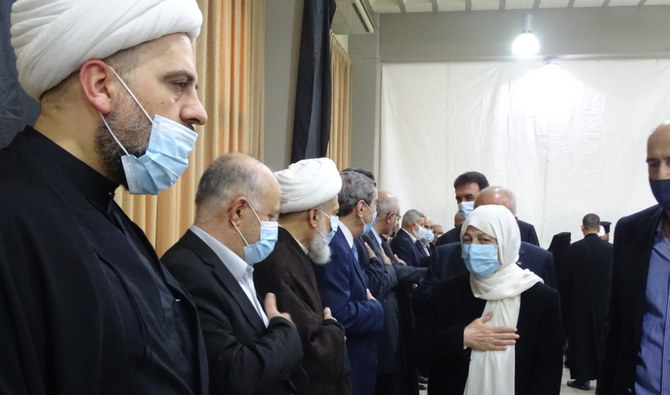BEIRUT: The Lebanese flag was set at half-mast on Tuesday to mourn the death of Sheikh Abdul Amir Qabalan, the head of the Supreme Islamic Shiite Council, at the age of 85.
The council is the official reference of the Shiite sect in Lebanon as Qabalan had been at the helm for the past two decades. A leadership power struggle is now underway between Hezbollah and the Amal Movement to fill his void.
Hezbollah, a Lebanese Shia Islamist political party and militant group, is backed by Iran while the Amal Movement is under the leadership of Nabih Berri, who has been serving as speaker of Lebanon’s parliament since 1992.
Eulogies for Sheikh Qabalan focused on his role in “maintaining coexistence and peace” but will his death shed more light on the growing rift between Hezbollah and the Amal Movement?
“The dispute normally shows between the two at the grassroots level, not the leadership level,” Academic and activist Mona Fayad told Arab News. “Both sides might agree on sharing power again or suspending any process to elect the head of the council.”
The council aims to manage the affairs of Shiites and works on improving their social and economic conditions. Its program also includes a clause to “support the Palestinian resistance and actively participate with the brotherly Arab countries to liberate the occupied territories, within the framework of a unified Arab strategy.”
According to Lebanon’s 2020 census, Muslims constitute around 69.4 percent of the population — 31.7 percent Shiites, 31.3 Sunnis, and the rest being Alawites and Ismailis.
However, the council has seen divisions following Hezbollah’s expansion to the core of the Shiite sect in Lebanon.
SPEEDREAD
Sheikh Abdul Amir Qabalan was the head of the Supreme Islamic Shiite Council for the past two decades before his death at age 85.
Some members of the council are supporters of Hezbollah, while others back the Amal Movement. This rift has grown in the past two years, as disputes between the council’s departments intensified following the decline in Sheikh Qabalan’s health.
In the past two years, independent Shiite clerics have spoken out and criticized corruption inside the council rooted in legal violations, favoritism, and the Hezbollah-Amal race for control of the Shiite community.
Fayad told Arab News that the council has come to play a negative role in regards to the rights of Shiite women.
“The role of the council is no longer clear as the elections have stopped. The electorate, which is composed of cultural, economic, professional, and political figures, has not met once,” she said.
“The council’s positions are now in favor of Hezbollah. The council has lost its efficiency and is now affiliated with Hezbollah, and we do not know the extent of the opposing forces’ presence in the council and their influence.”
Will the dispute between Amal and Hezbollah over the leadership of the sect’s religious reference become public? Fayad said Iran will certainly reject the eruption of any dispute over the authority of the council.
“Hezbollah and the Amal Movement are in a vulnerable position,” she said. “People are holding them responsible for the collapse and leadership positions are useless in saving people from the hell they drove people to.”
The council was established by Imam Musa Al-Sadr and approved by parliament in 1967. Two years later, the council’s general authority elected Imam Musa Al-Sadr as its first head, and after his disappearance in Libya in 1978, Sheikh Muhammad Mahdi Shams Al-Din became the head of the council. When the latter passed away in 2001, the council’s vice-president, Sheikh Qabalan, assumed the presidency of the council.

















